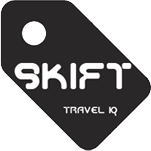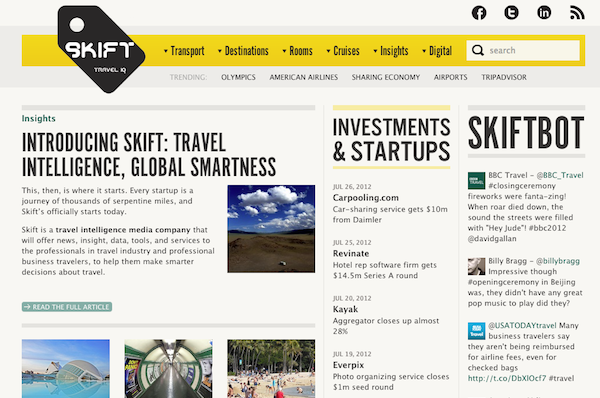 Ten years ago, Rafat Ali wanted to build a company that could chronicle the transformation of media and technology. Now he hopes to do it again, this time in the world of travel. His new project Skift sounds at first a lot like paidContent: a mix of original reporting and aggregation tailored for a savvy, niche, information-hungry audience.
Ten years ago, Rafat Ali wanted to build a company that could chronicle the transformation of media and technology. Now he hopes to do it again, this time in the world of travel. His new project Skift sounds at first a lot like paidContent: a mix of original reporting and aggregation tailored for a savvy, niche, information-hungry audience.
But this time around, Ali is placing his bet less on a stable of journalists and more on a team of product designers, developers, and, yes, journalists. Skift wants to be a media company in the same way Politico or Bloomberg is a media company: an information provider with a news wrapper. Skift bills itself as a “travel intelligence media company,” not a standalone news site.
Ali told me the way Skift will grow its audience and its fortunes will be through information services, not just news. “What we’re trying to do with Skift is scale quickly on content,” he said. “The more fortunate part for us is everybody covers travel in bits and pieces, so for us it’s a matter of bringing it all together.”
But Skift is more than just a curator of travel news. Ali and cofounder Jason Clampet want to collect a vast data library to build tools that would be useful not just to the travel industry but anyone hoping in a car, train or bus to get away. Ali has funded the site himself up to launch and has raised $500,000 from investors like former Wall Street Journal publisher Gordon Crovitz and former MySpace president Jason Hirschhorn. As designed, Skift — the Swedish word for “shift” — would be a media company built on a stable of products, not just content. “We’re starting with what we’re grandly sort of calling the world’s largest data warehouse of publicly available travel industry data,” he said.

That means things like visit and occupancy information that tourism boards report to the government, departures and delay information from airports, and flight data supplied by airlines to agencies like the FAA. It’s the type of information typically hidden away in Excel spreadsheets on seldom visited agency websites. “We’re gonna try and collect it, clean it, normalize it, put it in a dashboard that humans can understand, and then build services on top,” he said. He said they will also create APIs for the travel data they harness on the site.
Skift has a staff of four, including Ali, and they’ll be announcing the hire of a product development person soon. Ali stresses that as Skift grows they will hire more writers — but the writers will be focused on original reporting, not the things aggregation and curation can pick up more easily. Ali said curation is still an undervalued asset that can prove useful to content creators as well as their audiences. The day-to-day news of airlines’ fuel prices or the ebb and flow of tourism can be aggregated from elsewhere. Ali wants the site to chase the big stories, the airline bankruptcies and innovations in travel tech. “We’ll not get there in the next year, but we’ll get there in due time,” he said.
 Ali has been around the media game for a while, having sold paidContent to The Guardian in 2008 and left the company in 2010. He’s gained an insight into how a media business can stay viable today. Focusing on a niche audience is one method of doing that, especially if that audience is highly engaged and willing to spend. Business travelers and travel industry executives are just such an attractive bunch. “We look at business travelers, professional travelers a bit like tech fanboys, where they like to consider themselves like experts in what they’re doing,” he said.
Ali has been around the media game for a while, having sold paidContent to The Guardian in 2008 and left the company in 2010. He’s gained an insight into how a media business can stay viable today. Focusing on a niche audience is one method of doing that, especially if that audience is highly engaged and willing to spend. Business travelers and travel industry executives are just such an attractive bunch. “We look at business travelers, professional travelers a bit like tech fanboys, where they like to consider themselves like experts in what they’re doing,” he said.
Ali said it’s not enough to simply provide people with news — it has to be valuable or actionable information. It also helps if you can package multiple resources together. In the travel industry, businesses are divided into areas like editorial (travel guides), transactional (booking flights and hotels), and organizational (plan your trip, track your flight). But there’s a fair amount of randomness that goes along with that. You may look up art museums through Frommers, find your flight through Hipmunk, and use GateGuru to navigate airports. “With Skift, on the business traveller side, we’re trying to take the randomness out of the equation and make a more directed way of delivering information,” he said.
Also in the long-term plans for Skift: a membership or subscription service. Ali believes the possibility of better data tools for travel is a step in that direction. But another option would be to create events, something paidContent has had success with. Ali said the they plan to hold one major event, a travel analog to All Things D’s D conference, which would appeal to travel industry executives, travelers, and technologists. “We’re trying to build a crossover media brand, a new kind of media company where the underpinning will be data, and then media as the layer on top of it,” he said.
Image of Rafat Ali by Brian Solis used under a Creative Common license.